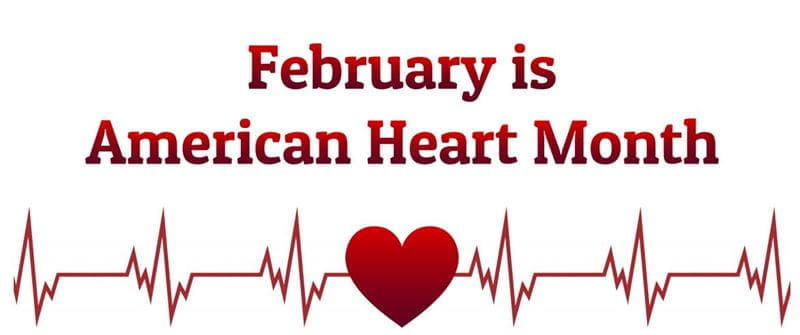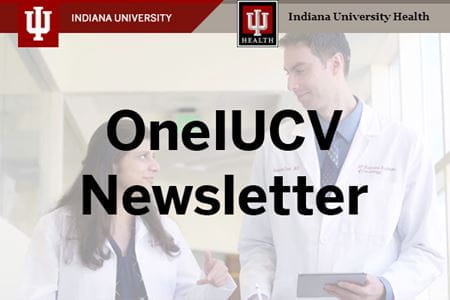Cardiovascular Institute
One, diverse academic health enterprise where people come to receive the highest quality heart and vascular care in their community while also enabling relentless innovation that fuels better health for Indiana and beyond. Read on to learn about recent advances in realizing this vision.
Connect to Promise
Four of our team members, Dr. Rolf Kreutz, Dr. Tanya Tanawuttiwat, Ashley Henthorn, NP, and Angie Snodgrass, showed true dedication to the health and safety of our patients by remaining in-house at Methodist and Eskenazi Hospitals during our most recent winter storm.

Welcome to our Team
 We are thrilled to announce the successful recruitment of Dr. Ankur Kalra from the Cleveland Clinic to Indiana University School of Medicine by IUSM/IUH Cardiovascular Institute and IUSM Department of Medicine, as the CV Institute Director for Interventional Cardiology Quality and Innovation. Dr. Kalra is a nationally, and internationally, recognized interventional cardiologist through his work advancing interventional quality and innovation, with additional expertise in health economics, outcomes and management. He has published over 250 scientific manuscripts in various peer-reviewed journals, and routinely presents late-breaking clinical trial results at national and international scientific meetings. He has uniquely advanced the combination of peer-reviewed science with cardiovascular social media to further drive the impact of cardiovascular innovations.
We are thrilled to announce the successful recruitment of Dr. Ankur Kalra from the Cleveland Clinic to Indiana University School of Medicine by IUSM/IUH Cardiovascular Institute and IUSM Department of Medicine, as the CV Institute Director for Interventional Cardiology Quality and Innovation. Dr. Kalra is a nationally, and internationally, recognized interventional cardiologist through his work advancing interventional quality and innovation, with additional expertise in health economics, outcomes and management. He has published over 250 scientific manuscripts in various peer-reviewed journals, and routinely presents late-breaking clinical trial results at national and international scientific meetings. He has uniquely advanced the combination of peer-reviewed science with cardiovascular social media to further drive the impact of cardiovascular innovations.

Please join us in welcoming Linda Altmeyer, MPH, to CV Institute to serve as the Director of Operations for the Krannert Cardiovascular Research Center and will be working on the operations and program development of the Center. She comes to us with over 20 years of experience, serving most recently as the Director of Education in the Department of Radiology at IU School of Medicine and prior to that as the Director of Programs for the Alzheimer's Association Greater Indiana Chapter.
Top News
IUH Bloomington Cardiothoracic Surgery Program Receives Three-Star Rating
The IU Health Bloomington Cardiothoracic Surgery Program has earned a distinguished three-star rating from The Society of Thoracic Surgeons (STS) for its patient care and outcomes in isolated coronary artery bypass grafting (CABG) procedures. The three-star rating, which denotes the highest category of quality, places the IU Health Bloomington Cardiothoracic Surgery Program among the elites for heart bypass surgery in the United States and Canada.
The STS star rating system is one of the most sophisticated and highly regarded overall measures of quality in health care, rating the benchmarked outcomes of cardiothoracic surgery programs across the United States and Canada. The star rating is calculated using a combination of quality measures for specific procedures performed by an STS Adult Cardiac Surgery Database participant. Approximately 20% of participants receive the three-star rating for isolated CABG surgery. The latest analysis of data for CABG surgery covers a 3-year period, from 7/1/2018 - 6/30/2021.
IU Health Methodist November 2021 Top Performer
Based on feedback from our patients, Cardiac Rehabilitation has earned the honor of being the IU Health Methodist Top Performer in patient experience for November 2021! This award recognizes the teams' efforts to deliver on the IU Health's Promise - The Best Care, Designed for You to build a culture where we demonstrate Whole Person Care and Personalized Approach with every person, every time.

Joint Commission Re-Designation Surveys
Congratulations to the following programs at IU Health Ball Memorial for an outstanding Joint Commission re-designation survey:
• Cardiac Service Line - Chest Pain Certification
• Stroke Program - Primary Stroke Certification
• Heart Failure Program - Heart Failure Certification
Our direct staff did an amazing job speaking with the surveyors and highlighting our programs. The surveyors were highly complementary of each program and were impressed with the quality of services sustained in difficult times during the pandemic.
Home is Where the Heart Is
Philanthropy-funded program enables cardiovascular patients in the East Central Region to participate in cardiac rehabilitation without leaving the comfort of their own homes.
Leadership Announcement
We are thrilled to share with you that effective January 2022, Alexander Smolensky, MD is the new IUHP Academic Cardiology Service Line (CSL) Director and IUSM/Division of Cardiovascular Medicine Director of Clinical Affairs, charged with further advancement of the clinical mission in line with the overall vision and strategy of the IUSM Division of Cardiovascular Medicine in the Department of Medicine. Dr. Smolensky was a postdoctoral research fellow at Krannert from 2002 to 2006 and completed his internal medicine residency at IU in 2009. After a postdoctoral research year in IUSM’s Division of Pulmonary & Critical Care Medicine, he attended Emory University from 2010-2014 for fellowship training in Cardiovascular Medicine and additional subspecialty training in Preventive Cardiology. After gaining 6 years’ experience in practice as a general cardiologist in Georgia, he was recruited back to join IUSM as faculty in 2020 and will matriculate from the Johns Hopkins University MBA program in 2022.
We are grateful to Dr. Kovacs for his many years of service in this position, and excited about the work that Alex has already undertaken to ensure the highest quality, most contemporary cardiovascular care for our patients.
Dr. Williams Announces His Retirement

After 46 years of service, Dr. Eric Williams has announced his retirement, effective June 30, 2022. Over the course of his career, Dr. Williams has made innumerable contributions to the clinical and education missions. His leadership and vision have been instrumental in the growth and success of IU Health Physicians Cardiology and the Division of Cardiovascular Medicine. He has trained generations of cardiologists, including two Presidents of the American College of Cardiology, defined the competencies required of the cardiologists of future generations, and has been recognized as a master clinician by both the American Heart Association and the American College of Cardiology. He is deeply loved by his patients and colleagues alike for his willingness to listen and provide thorough personable care.
We celebrate Dr. Williams as a teacher, colleague, inspiring leader, and caring physician. His influence on cardiology in the United States will long continue in those he has trained and mentored. Please join us in congratulating him on his well-deserved retirement.

Heart disease continues to be the greatest health threat to Americans and is still the leading cause of death worldwide. Find great information compiled by the U.S. National Institutes of Health to help take care of your heart and the hearts of those you love. The American Heart Association also has great online heart health lessons for co-workers, family and friends.
Hear IU Health Heart specialists Julie Clary, MD, Balaji Tamarappoo, MD, PhD, and William Gill, MD offer more about modern approaches to heart disease detection and prevention at this 'Talk with a Doc' IU Health Webinar.
Krannert Cardiovascular Research Center Highlights

Sudden blockage of coronary arteries supplying the myocardium contributes to millions of ST-elevation acute myocardial infarction (MI) in the world each year. Early reperfusion therapy in ST-elevation MI is lifesaving and is recommended by multiple societal guidelines as it can stop the initial wave of cardiomyocyte cell death and reduce the final MI size -- a key predictor of major adverse cardiovascular outcomes in the post MI setting. However, the benefit of reperfusion therapy is often paradoxically diminished as reperfusion itself can potentially double the MI size. Over the past few decades there have been extensive efforts to mitigate this reperfusion induced injury. Yet, why some patients experience extensive infarct expansion following reperfusion while others do not remains unclear. As a result, all reperfused MI patients are treated the same and currently there are no highly effective therapies which can target those patients at the greatest risk for extensive myocardial damage following reperfusion – leading to a number of calls to gather further insight into reperfusion therapy.
One of the known, yet underappreciated, consequences of reperfusion therapy is myocardial hemorrhage, which is reported to occur in ~50% of the reperfused MI patients. However, whether reperfusion hemorrhage contributes to final infarct size is not known. In his paper that was recently published in the high impact Journal of the American College of Cardiology, Dr. Rohan Dharmakumar and his team demonstrates that if the MI zone becomes hemorrhagic in response to reperfusion, it can significantly expand the MI size in post reperfusion period, independent of well-known predictors of MI size (ischemic extent and time). Their studies which followed MI size through the lens of time-resolved assessment of blood markers and noninvasive imaging confirmed their hypothesis. Controlling for infarct size immediately after reperfusion, they found that hemorrhage within the area at risk is a major determinant of final MI size. Dr. Dharmakumar and his team believe these findings transform the understanding of the role of hemorrhage in MI expansion and will trigger investigations for advancing acute care management, risk assessment and future therapeutics.
Kudos
Emerging Leaders
Erin Wilkerson, NP completed the Emerging Leaders Program through IU Health. This program is a six-month curriculum developed by the Learning Institute. It is designed to develop hard and soft leadership skills in team members who have demonstrated leadership across many planes but that are currently not in official leadership positions. Participants explore basic leadership and management topics, including effective communication and presentation skills, building trust, leadership coaching and time management. In addition to classroom sessions, emerging leaders are offered mentorship, leader debriefs, small group work and a variety of exposure to leaders at all levels, through storytelling, interviewing, panel discussions and more.
Honors and Recognitions
Congratulations to Dr. Onyedika Ilonze for being selected as a member of the Heart Failure and Transplant Section Leadership Council for a three year term starting in April 2022. Additionally, Dr. Ilonze was selected to attend the ACC Upping Your Game clinical trials research training program that lasts for three sessions from January to November 2022.
Publications
Dr. Asad Torabi and colleagues demonstrated the impact of social deprivation on cardiovascular outcomes in their paper recently published in the Catheterization & Cardiovascular Interventions Journal . Higher social deprivation was associated with higher risk of all-cause death as well as specifically cardiovascular death and recurrent MI among patients with a diagnosis of diabetes. There was no significant association demonstrated among patients without diabetes.
Cheers to our Advanced Heart Failure Team for their extensive comments on the topic "Heart Failure and Transplantation: Key Wins in 2021" in the Cardiology Magazine. There were many great advances in the field of heart failure and cardiomyopathies last year. The whole new class of drugs - myosin modulators - were introduced and tested in randomized clinical trials for heart failure with reduced ejection fraction, and even more importantly, in hypertrophic obstructive cardiomyopathy. A number of other trials advanced the management of heart failure by testing SGLT-2 inhibitors. Moreover, a great deal of knowledge has been accumulated in the area of cardiac involvement in COVID-19, including clinical outcomes and immunosuppression strategies and clinical variants.
Dr. Rolf Kreutz's recent publication in the Journal of the American Heart Association analyzed data from 9 centers in the IGNITE network pharmacogenetics working group where CYP2C19 genotyping was studied in the setting of PCI. Carriers of loss-of-function alleles of CYP2C19 who are treated with ticagrelor were at lower risk for major atherothrombotic events than those treated with clopidogrel. There was no significant differences in MACE events for patients with normal CYP2C19 metabolizer status (no loss-of-function) treated with clopidogrel as compared to ticagrelor or prasugrel. The results suggested that PCI patients treated with clopidrogrel should undergo genotyping so that CYPC219 loss-of-function carriers can be treated with alternate therapy.
Upcoming Events
Hoosier Health Series
Learn why the opioid crisis has IU Health experts concerned about the drug's impact on heart health. Join Pantila Bateman, MD, on and Michele Saysana MD, FAAP, on February 23 at noon for a discussion about how you can help stop the stigma and help reduce the impact of this crisis.
Register Here
Do you have a story that reflects the strength of our statewide system for cardiovascular care?
Please email OneIUCV@iu.edu so we can share with the team!
